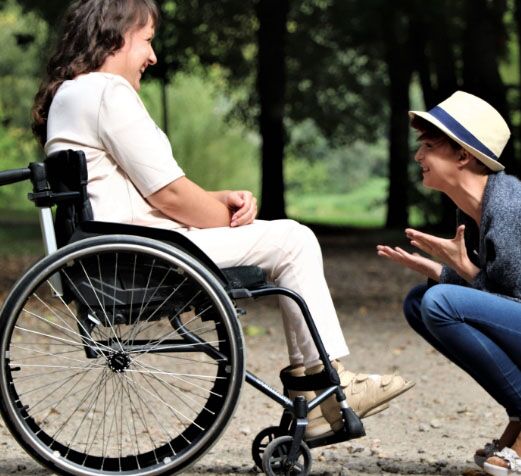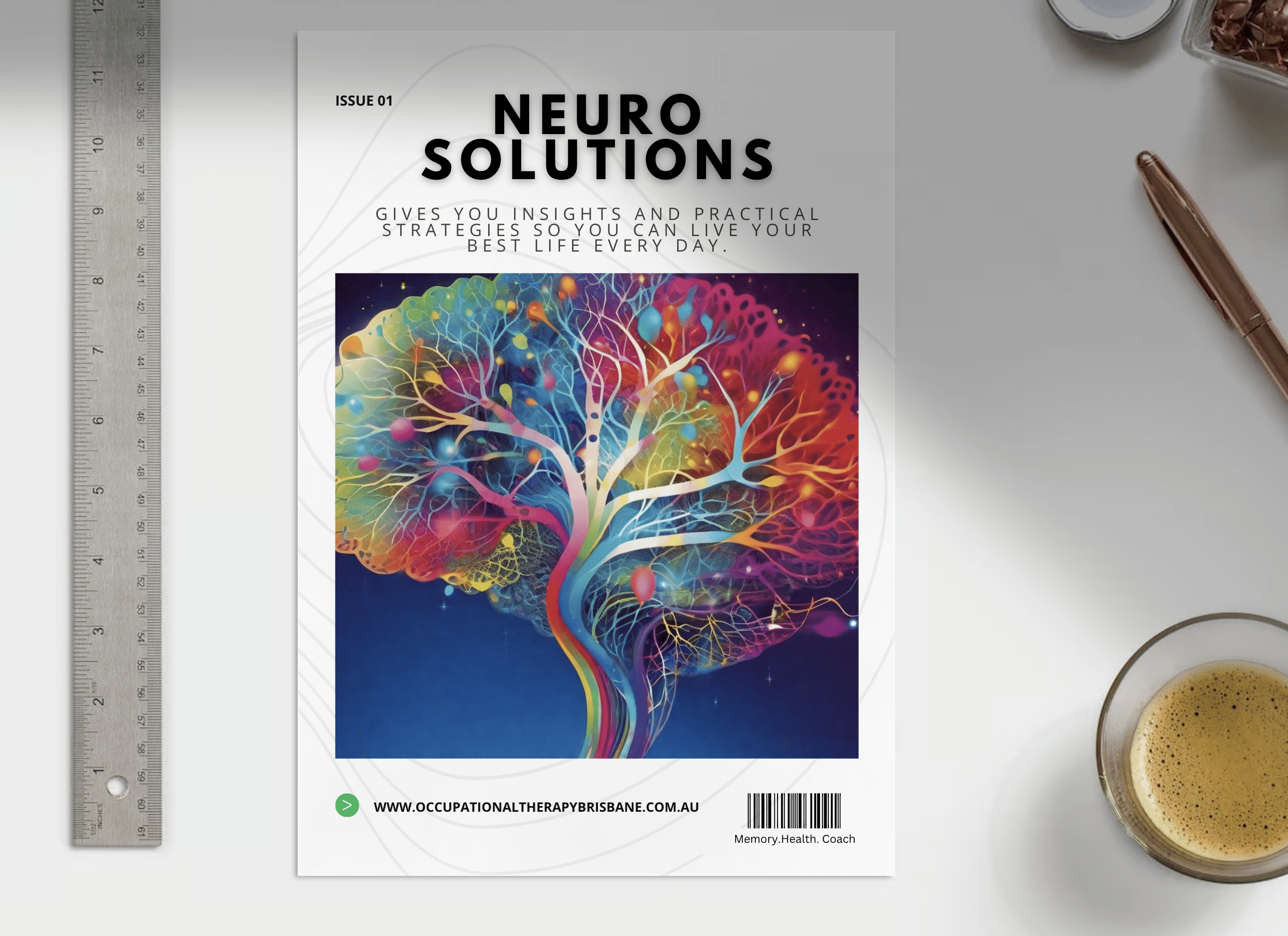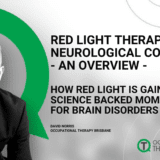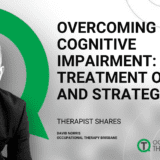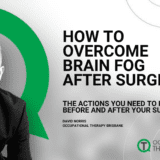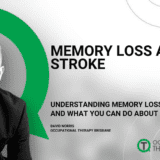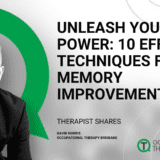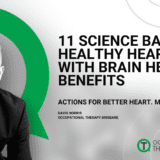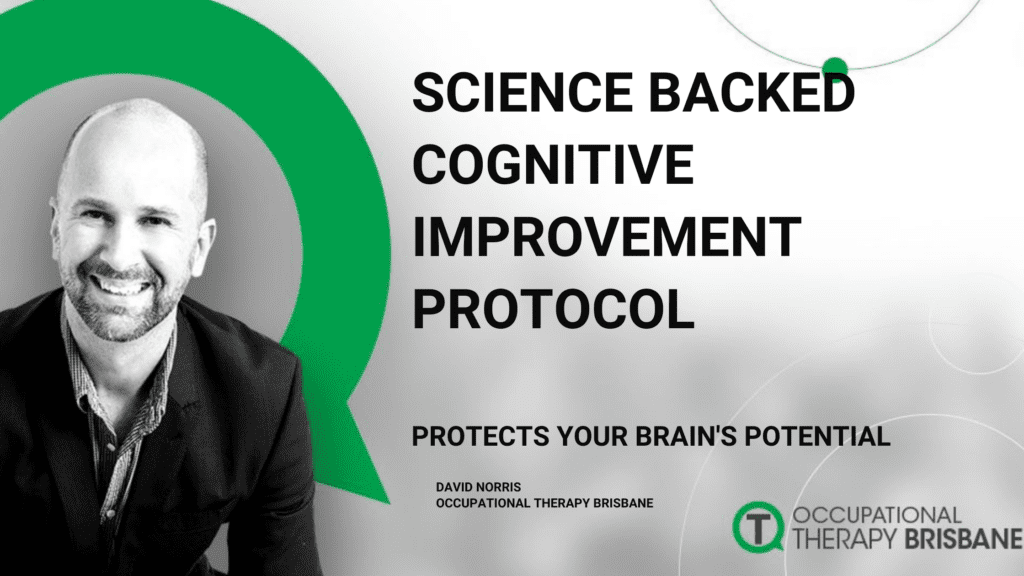
As we age, many of us may experience changes in our cognitive abilities. This process can manifest in various ways, such as memory loss, decreased attention span, and slower processing of information. However, it’s important to understand that cognitive decline is not inevitable and there are steps you can take for cognitive improvement as you age. More than cognitive rehabilitation, it’s what we wished folk were aware of before they come to our memory health clinic.

What Changes Happen To Our Brains As We Age?
The aging brain undergoes a variety of changes that can impact cognitive function. These changes within the brain can include;
- reduced blood flow to the brain,
- decreased production of neurotransmitters,
- reduced connections between neurons, and
- increase in neuro-inflammation.
- More recently in the investigative research are the possible changes to the microglia (the neuron support crew) as well. Think of them like gardener’s who trim, prune and shape the neurons performance and structure.
As a result, older adults may experience difficulties with memory, learning new information, and multitasking. However, it’s important to note that these changes are part of the natural aging process and do not necessarily indicate the onset of cognitive impairment.
What Factors Affect Cognitive Aging?
There are many factors that can influence the rate and extent of cognitive aging. These factors include
- genetics, lifestyle choices, physical health, and mental stimulation.
For example, engaging in regular physical exercise, maintaining a healthy diet, staying socially active, and challenging the brain with new activities can all have a positive impact on cognitive function in older adults.
Additionally, managing chronic conditions such as diabetes, high blood pressure, cholesterol and depression can also help to preserve cognitive health.
Definition of Cognitive Improvement
Before we dive headlong into the ins and outs of cognitive improvement we should square away what we are talking about.
You see cognitive improvement refers to the enhancement of cognitive function, which includes processes such as memory, attention, language, and problem-solving abilities. This improvement has been shown to be achieved through a pharmacological and non-pharmacological interventions. This term for the purpose of this article is specifically for adults who are at risk of cognitive decline or who are experiencing mild changes.
In our opinion every adult should have access to cognitive improvement programs that are tailored to their needs, risks and goals.
And it’s clear why.
Up to 40 % of dementia cases could in fact be prevented by acting on modifiable factors (e.g., cardiovascular factors, depression, physical inactivity, social isolation, education)
Source: alzres.biomedcentral.com
As mentioned earlier, you can divide the strategies into two camps.
The first, pharmacological interventions which involve the use of medications to target specific cognitive functions, such as memory or attention.
The second are non-pharmacological interventions, that includes cognition-oriented treatments, non-invasive brain stimulation, physical exercise, and lifestyle-related interventions. These interventions aim to improve cognitive function through various means, such as providing cognitive training exercises, stimulating the brain through light, electrical or magnetic fields, promoting physical fitness, and encouraging healthy lifestyle habits.
While these interventions have shown potential benefits in improving or maintaining cognitive function in the elderly, there are also limitations to consider. For example, pharmacological interventions may carry side effects, and non-pharmacological interventions may require sustained effort and adherence to the treatment regimen.
Recent evidence suggests that a combination of these interventions can effectively enhance cognitive function in older adults, providing hope for the maintenance of cognitive health in aging populations with an exciting body of evidence looking at “multi-modal” or “multi-pronged” approaches as being clinically effective (Ngandu et al, 2015., Rao et al, 2021).

So, What Does The Literature Reveal About Cognitive Protocols?
First things first, a review of the literature is always an essential part of any research project as it provides a comprehensive overview of the existing body of knowledge related to the topic at hand. From Randomized Control Trials (RCTs), Meta Analysis to Systematic Reviews, these levels of research helps us understand what works and what doesn’t or perhaps a more nuanced view, what we need to do more.
Whilst this memory health blog isn’t a peer reviewed paper, BUT we are serious about presenting information based on evidence.
Previous Studies on Cognitive Improvement
Previous studies on cognitive improvement have examined the effects of both pharmacological and non-pharmacological interventions on cognitive function in the elderly.
According to a meta-analysis conducted by Chen and colleagues (2022), pharmacological interventions such as cholinesterase inhibitors and memantine have been shown to enhance cognitive function in individuals with Alzheimer’s disease (AD). The authors emphasized the significance of successful drug development in improving or preserving cognition in older adults. Despite ongoing research into various targets for enhancing cognition, only a few drugs have been approved for improving cognition in AD, and there are currently no approved drugs for cognitive protection in people living with Mild Cognitive Impairment.
Non-pharmacological interventions, such as cognitive training, or the “mutli-factor” approaches have also been shown to have a positive impact on cognitive function in older adults.
Multiple studies conducted in the past decade have demonstrated that non-pharmacological interventions can significantly improve cognition. These interventions encompass various categories, such as cognition-oriented treatments, non-invasive brain stimulation, physical exercise, and lifestyle-related interventions (Gavelin et al., 2020; Sikkes et al., 2021).
A meta-analysis by Lampit et al. (2014) found that cognitive training interventions led to significant improvements in global cognition, memory, and verbal fluency in older adults. Additionally, cognitive stimulation, which involves engaging in mentally stimulating activities, has been shown to have a protective effect against cognitive decline in older adults (Hsu et al., 2015).
Nutrition, specifically the Mediterranean Diet, has had positive findings in prevent and reduce the likelihood of at risk adults progressing to further cognitive decline ( Cuelho-Junior et al, 2021)
Cognitive rehabilitation, which focuses on improving cognitive function through targeted interventions, has also been found to be effective in improving cognitive function in the elderly (Gates et al., 2011).
Overall, both pharmacological and non-pharmacological interventions have been shown to have a positive impact on cognitive function in older adults, with cognitive training, cognitive stimulation, and cognitive rehabilitation all playing important roles in cognitive improvement.
Future of Cognitive Improvement Protocols
A study by Rao and colleagues in 2021 describes a personalised program, known as the Recode Protocol, can make a significant difference in reducing the risk factors associated with Alzheimer’s disease (AD). This “mutli-pronged” brain health program addresses various aspects and is tailored to each individual.
Background of this current study
When it comes to Alzheimer’s disease (AD), conventional treatments have shown only marginal and short-lived symptomatic effects. This indicates that relying solely on a single-drug, monotherapeutic approach might not be the most effective strategy. Recognising this limitation, the Pre- Post Study explores an alternative—the ReCODE (Reversal of Cognitive Decline) system.
Originally successful in a limited proof-of-concept trial, this novel and personalized therapeutic system aims to go beyond the traditional approach. The study investigates whether scaling up the ReCODE program could positively impact cognitive and metabolic function in individuals diagnosed with subjective cognitive impairment, mild cognitive impairment, and early-stage AD.
According to the authors they reported
- not only improved risk factor scores but also showed the ability to stabilize or even reverse the decline in cognitive function.
Even though the initial trial involved a small group of highly trained physicians, the promising outcomes suggest that with more training and experience, this personalized approach holds potential for preventing and reversing cognitive decline. These findings hint at a hopeful avenue for enhancing brain health and combating cognitive challenges.
Reservations About This Study
Pre-post studies, while informative, have inherent limitations when it comes to establishing a robust evidence base for healthcare interventions. The major limitation here is the lack of a control group for comparison. Without a group that does not receive the intervention, it’s challenging to attribute changes solely to the intervention rather than other external factors. No doubt, no pharmaceutical company will be funding this type of study so one can argue the authors are doing the best they can.
High Quality Study Supports Multifaceted Approach to Cognitive Improvement
That said, there is some consistency with previous studies such as the randomized control trial (high quality study) by Ngandu and Colleagues in 2015. They completed a study that validates the combined approach targeting various aspects of life can be beneficial for cognitive health.
The study called “FINGER“, explored how addressing different factors like
- lifestyle and vascular health could help prevent cognitive decline in at-risk elderly individuals.
The results indicated that this comprehensive approach could either enhance or sustain cognitive function in these individuals. This aligns with the concept of a multifaceted approach to cognitive improvement, endorsing the idea that addressing multiple aspects of life can be a promising strategy for promoting cognitive well-being.
Research Gaps in the Field
The emerging field of cognitive improvement research has made great strides in recent years, but there are still some significant gaps that need to be addressed.
One of the main areas of concern is participant adherence to cognitive training programs. Many individuals struggle to maintain engagement with these programs over time, leading to suboptimal results.
Another area of concern is the lack of multimodal interventions that are easy for participants to apply in their daily lives. In clinical settings of within well controlled study protocols, there is reasonable compliance, uptake and consistency. In real life, when the study moves to the home, that’s where it falls down.
At OT Brisbane, we’ve strived to help make cognitive health changes “stick” and it’s part of our program formula. While cognitive training is important, it is also critical to address lifestyle changes and other factors that can contribute to cognitive decline. It’s one critical focus of our memory programs
Additionally, the ease of cognitive programs themselves is a significant limitation. Many current interventions are complex and difficult for participants to use effectively. Furthermore, the feasibility of interventions is a major concern, as not all individuals have access to the necessary resources or support to participate in cognitive improvement programs.
Depending on where a person is at on their cognitive health journey, another support person may be a vital component in a programs success. That said, when a person is handed all the treatment at once, it’s too demanding on the person. That’s why a graded approach is highly recommended that tackles those aspects that are important to you!
Looking to the future, there is a need for more investigation into the potential for video conferencing and trial runs with neuro-assistive technology to improve the participant experience.
These emerging technologies have the potential to make cognitive training more accessible and engaging for a wider range of individuals. By addressing these gaps in research, we can work towards more effective treatments for mild cognitive impairment and ultimately improve the lives of those affected.
What Are The Cognitive Assessments Used to Measure Improvement ( What To Avoid)
Common cognitive assessments used to measure improvement in cognitive function after cognitive training include the Mini-Mental State Examination (MMSE) and the Montreal Cognitive Assessment (MoCA).
The MMSE is a 30-point questionnaire that measures cognitive function, including orientation, memory, and attention. Meanwhile, the MoCA is a more detailed assessment that evaluates various cognitive domains, such as visuospatial abilities, executive function, and language.
However, these tools have limitations, as they are often considered too brief and lacking in detail and utility over time. They are often focused on detecting “cognitive deficit” rather than improvements in cognitive performance. So yes, they can show a person’s cognitive status, but a score of 30/30 on the MMSE or MoCA doesn’t reflect the cognitive health changes an individual with personal concerns has about their cognitive performance.
Yes, they have their place, BUT, not for supporting cognitive health nor for deep investigation of cognitive complaints.
This has led to the emergence of new tools, such as online memory assessments and cognitive panels, which allow for more comprehensive and customized cognitive evaluations. At Occupational Therapy Brisbane, for example, utilizes these emergent tools to provide more tailored and effective cognitive assessments for our clients.
We’ve found that using these tools, therapists can gain a more thorough understanding of an individual’s cognitive strengths and weaknesses, ultimately leading to more targeted and effective cognitive training programs.
As technology continues to advance, the field of cognitive assessments is evolving, offering more precise and personalized ways to measure cognitive improvement.

What Should Protocols for Cognitive Improvement Consider
From our perspective, cognitive enhancement techniques are non-pharmacological approaches that aim to improve cognitive abilities in individuals with and without impairment. These techniques include cognitive interventions
- cognitive training, mental and physical exercises, neurofeedback, non-invasive brain stimulation, and lifestyle changes.
Cognitive training involves structured programs that target specific cognitive functioning such as memory, attention, and problem-solving. These programs have shown to be effective in improving cognitive abilities and overall brain function.
Non-invasive brain stimulation, such as transcranial photobiomodulation, has also demonstrated promising results in enhancing cognitive performance.
In addition to these techniques, lifestyle changes such as regular exercise, a healthy diet, and adequate sleep have been linked to improved cognitive function (Ngandu et al., 2015).
Exercise and Physical Activity
According to the literature, aerobic exercise has been shown to have significant positive effects on cognitive function. One study found that aerobic exercise was linked to improved executive cognitive function, including cognitive flexibility and working memory. This type of exercise has also been found to have neuroprotective effects, helping to protect brain health and reduce the risk of cognitive decline in older adults.
In addition, research suggests that there is a dose-response relationship when it comes to the cognitive benefits of aerobic exercise. This means that the more frequently and intensely older adults engage in aerobic exercise, the greater the improvements in cognitive capacity that they may experience. On the other hand, the effects of resistance exercise on cognitive function seem to be less robust, with less consistent evidence supporting its impact on cognitive performance.
Overall, the findings of multiple studies highlight the importance of incorporating regular aerobic exercise into the daily routine, especially for older adults, in order to enhance cognitive function and maintain brain health.

Are There Any Pharmacological Interventions for Cognition Improvement In The Aging Brain
As the population continues to age, the need for effective pharmacological interventions to improve cognition in the aging brain becomes increasingly crucial. Currently, there are a limited number of drugs approved for cognitive improvement in conditions such as Alzheimer’s disease and mild cognitive impairment. These approved drugs primarily target symptoms rather than the underlying causes of cognitive decline.
However, there is ongoing research and development focused on identifying promising drug targets that could lead to more effective treatments for age-related cognitive impairment. These potential drug targets aim to address the root causes of cognitive decline, including neuroinflammation, amyloid beta accumulation, microglia activation and neurotransmitter imbalances.
Despite the availability of approved drugs, their disease-modulating effects are limited, especially for long-term experiences of Alzheimer’s disease and mild cognitive impairment. This highlights the critical need for the development of new pharmacological interventions that not only improve cognitive function but also slow down the progression of these debilitating conditions.
By targeting specific pathways and mechanisms involved in cognitive decline, these promising drug targets pave the way for more effective and impactful treatments for the aging brain.
We’d encourage you to have a conversation with your GP or seeking a referral to a specialist such as a neurologist or geriatrician to discuss medication pros and cons.

Elevate Your Cognitive Health In Brisbane Brian Health Clinic or Online!
As the chapters of life unfold, you’d appreciate by now your cognitive well-being plays a starring role. It underpins your ability to live life on your terms, to do what matters. If you’ve sensed subtle shifts in memory, attention, or processing speed, consider it a call to action rather than a cause for concern.
Lets start your cognitive health transformation with Brisbane based Brain Health Service where you can access services in the clinic or online.
Here’s What You Can Expect
- 🧠 Personalized Assessment: Crafted for your unique cognitive, goals and concerns.
- 📚 Comprehensive Strategies: Beyond rehabilitation, we’ll also focus on prevention and enhancement.
- 👥 Clinical Guidance: Partnering with skilled professionals helps you focus on what’s important for you
Ready to Seize the Moment for Cognitive Wellness
Connect with Occupational Therapy Brisbane at 1300 783 200. Your path to a sharper, more vibrant mind begins with a simple call. Schedule an initial Discovery Consultation today.


